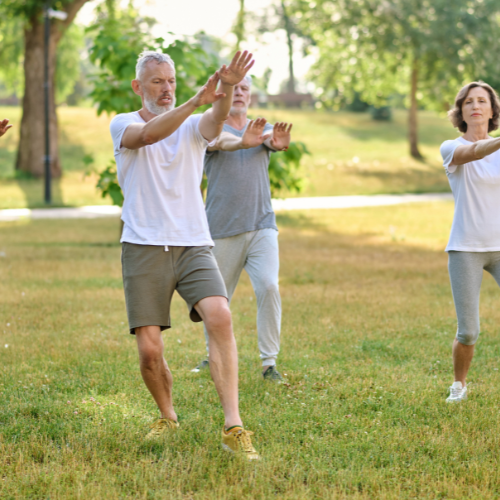Target Audience:
- Patients with chronic diseases, low energy levels, or deficiency conditions.
- Suitable for individuals looking to enhance their overall constitution.
For specific or special dietary and exercise needs, such as diabetes patients, guidance from a TCM practitioner is recommended.
[1] Daily Routine
Ensure sufficient and high-quality sleep; staying up late is detrimental to health.
Recommended daily routine times: Wake up 7:00-8:00 am, Sleep 10:30-11:00 pm
Tips:
- Adults should avoid sleeping later than 11:00 pm, and children no later than 9:00 pm.
- Avoid drinking water within one hour before sleep, and avoid consuming hot milk before bedtime.
- Avoid eating any food/snacks after 9:00 pm.
- The best time for bowel movements is before 9:00 am.
[2] Exercise
Choose age-appropriate and suitable exercises; improper exercises may lead to health risks and physical depletion.
Recommended basic exercises:
- Alternating brisk walking and slow jogging for 3-8 kilometres, 3-6 times per week. Gradually increase exercise duration. (Preferably during warm morning hours with sunshine)
- Traditional internal Qi exercises (e.g., Ba Duan Jin, traditional yoga) for 20-30 minutes daily.
Tips:
- Any strenuous exercise that causes sweating during night time is strongly not advisable.
- People over 40 or those with weakened constitutions should be cautious with excessive aerobic or anaerobic exercises and seek advice from a TCM practitioner.
- Pay attention to weather conditions; avoid outdoor exercise in windy or rainy weather.
- Swimming may not be suitable for everyone, and strength training should be based on the individual constitution.
[3] Mental Well-being
Maintain emotional stability and a positive outlook, as they greatly benefit physical health. Address emotional issues like anxiety, irritability, and low mood promptly and seek medical help when necessary. Avoid suppressing or accumulating emotions.
Recommended stress-relief methods:
- Meditation: Daily, preferably 20-30 minutes before bedtime.
- Tiny ball sports: Table tennis, badminton, etc.
Tips:
- TCM offers effective techniques for relieving common anxiety and emotional issues.
- Optimize and adjust your existing daily routine when necessary.
[4] Hydration
Proper hydration is more important than commonly thought, especially when misconceptions are widespread.
Recommended water intake: Unless engaged in specific strenuous activities, daily water intake should not be excessive. About 4 cups for an average person is sufficient, adjust based on height, weight, and seasonal changes.
Tips:
- The “eight glasses of water per day” concept is a misconception and often excessive. It can cause kidney issues.
- Learn to understand your body’s natural cues for adequate water intake; just maintain a state of not feeling thirsty.
- Frequent thirst or urination abnormalities should be resolved through TCM or other professional treatment.
- Milk should not be used as a substitute for water.
- Various soft drinks are not recommended for regular consumption.
[5] Diet
Diet profoundly impacts health, especially long-term wrong eating habits, which can have irreversible negative effects. Therefore, the diet should be taken very seriously.
Basic principles of a healthy diet:
- Choose natural ingredients, minimize processed foods, and avoid foods with additives and preservatives.
- The balance between animal and plant-based foods, opt for healthier cooking methods like steaming and stir-frying.
- Prefer easily digestible foods.
- Stop eating when about 80% full; always avoid overeating.
- Not all individuals are suitable for traditionally perceived healthy foods like raw vegetables, fruits, raw meat, nuts, dairy products. Follow TCM guidance based on the individual constitution.
- Adjust diet further based on specific illness characteristics; e.g., individuals with damp-heat constitution should avoid lychee and longan fruits; allergy patients should avoid seafood and spicy foods.
[6] Unhealthy Habits
Improving or quitting harmful or addictive habits is crucial for a healthy lifestyle. Some common unhealthy habits include:
- Prolonged sitting.
- Addiction to activities like excessive gaming.
- Smoking.
- Consistently staying up late.
- Excessive sexual activity or masturbation.
- Excessive alcohol consumption.
- Long-term reliance on medication.
- Long-term/unnecessary use of various health supplements.
- Engaging in exercise, health practices, or lifestyle habits that might seem healthy but aren’t suitable for one’s own physical condition.
If you need personalized health guidance or a tailored diet and exercise plan, you can book a professional TCM health consultation in-clinic or online.
For weekly online professional guidance and tool support in lifestyle optimization, you can consider subscribing to our Pro Care service.
Published @June 6, 2024 | Author Max Ma | TCMDrMa All Rights Reserved


















Talk about how to prevent rheumatoid arthritis from daily habits